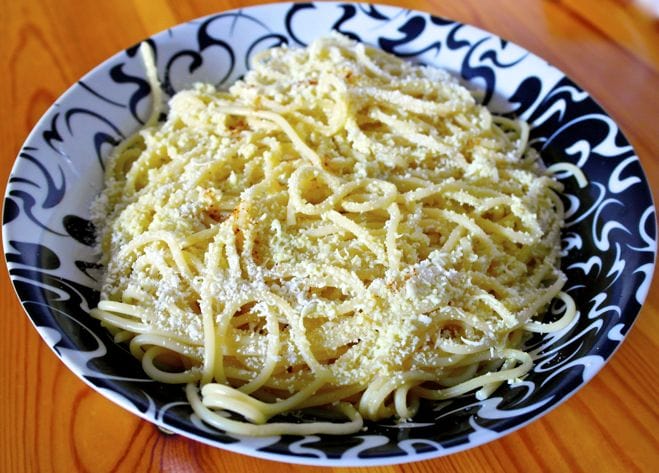Mama’s Greek Cheesy Spaghetti

Spaghetti, also known as makaronia in Greek is a bit different in Greece than it is from our neighbor Italy. Here, traditionally pasta is not cooked al dente, but rather cooked longer along with beef, chicken or even seafood.
A popular way it is cooked at home is with olive oil (or butter) and cheese.
By looking at the picture you may not see more than some pasta sprinkled with cheese, but there is a little secret here that makes this pasta addictive.
I rarely make it this way at home because it is so addictive that you can eat a whole bowl, but I did make it a few days ago while on vacation. My father was visiting and so I decided to make a quick meal of some pasta with a salad to eat when we came back from the beach. However, I was a bit worried that he would find my pasta very plain compared to the way my mom makes it, as I usually just boil it, add a touch of olive oil and the sauce. I was sure he would call it nerovrasta, which is an expression of describing food that is just boiled in water, which Greeks rarely do.
So I decided to make it more rich, the way my mother makes it. This recipe calls for layering the pasta in a large bowl or pan after boiling it with grated cheese, (mitzithra) and then gently heating some olive oil with some more cheese and pouring it over the pasta.
Yes this is not very light, but is not extremely heavy either as there is no meat in it and not that much cheese either. I also have lightened considerably as traditionally this pasta was made with butter by families who could afford it. Also we usually accompany it with a tomato and cucumber salad.
Mama’s Greek Cheesy Pasta
INGREDIENTS
- 1 pound spaghetti
- ½ cup grated cheese
- 1/3 cup olive oil
DIRECTIONS
1. Boil the pasta about 12 to 13 minutes
2. Once the pasta is boiled, drain well.
3. In a large pan or casserole dish sprinkle the grated cheese and place a layer of boiled pasta over it, sprinkle the pasta with cheese again and continue until you have filled the pan and finish with another sprinkle of cheese. Set aside.
4. In a small pan, heat the olive oil with a sprinkle of cheese at low heat for a few minutes. Pour the olive oil -cheese mixture over the pasta.

The Greek restaurant in Oak Harbor, WA, made something they called “Greek spaghetti”. They retired and the restaurant closed so I’m looking for a recipe. It was simple (spaghetti, olive oil, butter, and cheese). This one looks closest but what kind of cheese?? Thanks.
I love that you include recipes like this that are so “homestyle”. They are important in understanding Greek cooking, yet you don’t often see recipes like that included in cookbooks.
Thank you!
Thank you Maria! I agree, I think it is important to have firsthand experience when sharing recipes.
There is a restaurant chain here in the U.S. that serves this made with browned butter instead of olive oil and yes, it is quite delicious! We went there last night for a birthday celebration and I had this as a side with chicken. It had been years since I had eaten it as I try to not eat much pasta. They also serve broccoli with mitzithra as a side dish. This is a wonderful recipe for a special occasion, your taste buds will thank you.
We’ve done it with asiago or parmiagano reggiano in a pinch but it really is best with mitzithra.
Thanks for sharing Rachele!
I could not find Mizithra at my local grocery store that has many specialty cheeses. I looked through their custom order book and it had it. It also mentioned similar cheeses and Romano was listed. I decided to go with that. Can’t imagine it will be bad!
John, that will work too! But if you come across mitzithra you should try it too, to get the authentic taste.
Actually, I think there are very similar recipes in Southern Italy, and there is a dried Ricotta Salata that is very similar to its Greek cousin Mizithra; in many home recipes I use them interchangeably, whichever is cheaper. Neither of these are as fatty as recipes from the Americas where the pasta just swims in cheese.
If you are home alone, simply make a modest portion. You are unlikely to make another.
Thank you, what type of cheese is best for this dish.
Mizithra…
Mizithra, definitely!
My family makes it from scratch. It’s time consuming, but totally worth it.
Hi Joe,
Mitzithra is a cheese made from whey. When it is fresh it is soft a bit like ricotta, when it is dry it is hard and it is grated and used with pasta.